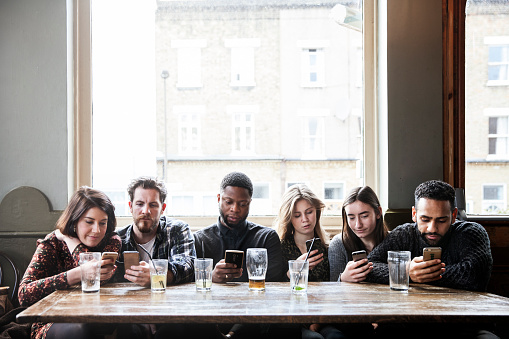
It’s a famous quote from Joe Pulizzi, Founder of Content Marketing Institute:
“Don’t build your content house on rented land.”
All FB properties down.
A reminder: Do not build your content house on rented land.
— Joe Pulizzi (@JoePulizzi) October 4, 2021
In other words, focus on your website, blog, email list and other “owned properties.” Use social media sites like Facebook and Twitter, but don’t put all of your eggs in their baskets. Those who put all their eggs in Facebook’s baskets suffered during the recent outage.
Habit-forming
But here’s why brands are addicted to Facebook:
It’s a daily habit for billions of people around the world.
One study I found said that smartphone users check Facebook an average of 14 times per day. Brands aren’t the only ones addicted: Facebook’s users are as well. Brands yearn for users’ attention and they know that Facebook is an avenue to that attention.
Email 📬 isn’t really a habit
Popular email newsletters (e.g., Morning Brew, Axios AM, theSkimm) become daily habits. These newsletters are sent every day and subscribers will actually complain if their daily hit doesn’t arrive on time. I consider these popular daily newsletters an exception.
Most of us don’t send daily and don’t have the same reach or impact. When Facebook was down, some brands sent witty emails to their subscribers to make fun at Facebook’s expense (and dish out a coupon code or two).
But unlike a daily email like Morning Brew, most brands’ emails are interruptive. Users must stop what they’re doing and decide whether to open the email. Some will delete without reading, while others will save it for later.
Coming back to Facebook:
It’s power is in the inverse. It’s users come to Facebook — Facebook doesn’t come to them. Which makes me wonder:
Can we have success building experiences that create daily habits for our users?
Here are a few ideas.
Breaking news podcast 🎧
I’m a fan of the New York Giants football team — eulogies and condolences are welcome. I subscribe to a podcast called “Locked On Giants,” hosted by Giants beat writer Patricia Traina. Patricia covers news throughout the week and also does a preview episode to discuss the upcoming game.
I tune in religiously to her Monday morning episode in which she breaks down what happened in the Sunday game.
Now available: .@D_Turner47
and I break down yesterday’s debacle. Some great stuff in this pod from David about the run defense and some of the coaching decisions. https://t.co/lXibx1oNpYOn YOUTUBE: https://t.co/GGf85mpGB7 pic.twitter.com/8T9xmIMUPl
— Patricia Traina (@Patricia_Traina) October 11, 2021
It’s appointment listening for me during the season: I make sure to find time to tune in on Monday’s. It’s a habit. What if you could become the go-to source in your industry when news breaks? If your podcast became known for interesting and unique insights on industry news, then you could form habits with your audience in the same way I follow “Locked On Giants.”
Daily game show 💰

In its heyday, HQ Trivia was an extremely popular app. There were live trivia contests each day, with real money given away. Get a question wrong and your game was over. Stay on till the end and you were one of the winners.
Sure, users were enticed with the prospect of winning money, but beyond that, there was the excitement of a live experience, the thrill of the unexpected and the ability to test your knowledge. I bet large crowds would show up if the jackpot was much smaller.
Could your brand incorporate some of these dynamics to create a live, app-based contest? Maybe it’s a trivia game for your industry or a game that tests users’ memories.
Shared missions 🤝
I’m a fan of true crime podcasts. I particularly enjoy versions in which the crime is unsolved and the investigation unfolds episode by episode. At the end of an episode, the host might say:
“Here’s your homework for this week. The last person to see Jane had a first name of Joe. His last name is unknown, but he was seen driving a light blue Ford Taurus. The license plate ends in the letters M-N. If you live in Sacramento and see a car that meets this description, please text details to 555-1212.”
These stories have the potential to form highly engaged communities of listeners and amateur detectives. Everyone does their best to help solve the murder. The result is habit-forming: after listening to this week’s episode, you can’t wait for next week’s to come.
How can your brand create a shared mission that your community solves?
Asking the bigger question 🤔
Having laid this all out, I have to ask:
Is it that important to form daily habits with our users?
Instead, what if we were there to serve them in their moment of greatest need? Would that suffice?
